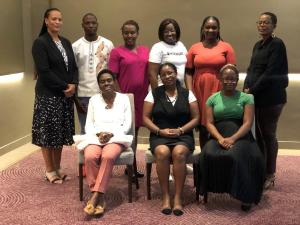Namibia’s infection prevention and control strategies regarded as good practice for health emergencies
The COVID-19 pandemic has underscored the critical importance of Infection Prevention Control (IPC) and viewed by many as a positive factor in strengthening IPC within countries. IPC measures have played a pivotal role in mitigating the spread of the virus, protecting public health, and alleviating strain on healthcare systems. These measures have served to safeguard not only healthcare workers but also the wider population, highlighting IPC's indispensable role in upholding healthcare safety standards.
The World Health Organization (WHO) conducted an IPC study, which included undertaking two case studies in two different countries and regions with varying IPC histories – outlining the “IPC journey” and experience in the last three years and the role of WHO's Health Emergencies (WHE) IPC in the evolution and outcomes. The two countries nominated for this study were Namibia and Nepal. Namibia was chosen as a partner country due to its enthusiasm for understanding and learning from the COVID-19 pandemic.
In Namibia, the IPC case study was conducted by the London School of Hygiene & Tropical Medicine (LSHTM) in collaboration with WHO and the Ministry of Health and Social Services. The study aimed to illuminate issues that underpin or are causally related to both the positive and negative experiences, outcomes and impacts by looking at three main pillars:
- IPC Guidelines & Guidance, assessing timely access, alignment, usefulness, and outcomes – (i.e., outcome description and WHO IPC contribution)
- Risk Communication and Community Engagement (RCCE) products assessing awareness/usage, Usefulness and quality, and Outcomes/impacts
- IPC training assessing awareness/access, outcomes/impacts, and improvements & learning
The case study used an outcomes harvesting approach involving an intensive study of a few “cases”, looking at multiple sources of evidence, including quantitative and qualitative data to allow drawing of hypotheses about the impacts of the three pillars in the Namibian context. This evaluation method involves collecting evidence of achieved outcomes and analysing how these elements contributed to changes. The approach is participatory, capturing outcomes that different stakeholder groups consider important. It allows participants to reflect on their practices and how they have contributed to change, ensuring that the three pillars are effectively integrated into the overall healthcare system.
The workshop took place between 5 – 7 March 2024 and targeted the frontline healthcare workers and support staff from both public and private sectors who were actively involved in the pandemic response efforts. Dr Femi Nzegwu, an Assistant Professor from the Monitoring, Evaluation and Learning at UK Public Health Rapid Support Team at the LSHTM was the main evaluator, working with the IPC healthcare workers to identify areas of impact in their IPC experiences and then work backward to examine what, if any, linkages there are with the work of the WHE IPC team.
On day 1, the team was divided into smaller groups to discuss questions relating to the three pillars and reported back at the end of each session. A validation workshop was held on day 2 to review the findings, assess structures in place for sustainability, identify gaps, and provide key recommendations on access, use, and outcomes of the three pillars of work on Namibia's capacity to manage IPC during COVID-19. On day 3, the main evaluator and WHO Country Office team visited two healthcare facilities, Intermediate Hospital Katutura, and Windhoek Central Hospital, to gain practical and evidence-backed insights and understanding of the practice on the ground in retrospect.
Additionally, a survey targeting healthcare workers at sub-national level facilities was conducted to get broader insights on improving policies on IPC and increase the understanding of the country’s status. The main evaluation held one-on-one virtual interviews with subnational (district) targeting policy makers, particularly the cadres of regional director, chief medical officer, senior medical officer, matron (nurse manager) and IPC Focal Point from different regions.
The process helped to identify the degree to which IPC workstream has produced results in the country, to capture what has worked well in practice and any barriers to success, as well as to outline how the success can be sustained beyond the pandemic period. This enabled the country to prepare better for future pandemics and adapt the WHE IPC products to meet the needs of the country during such times.



